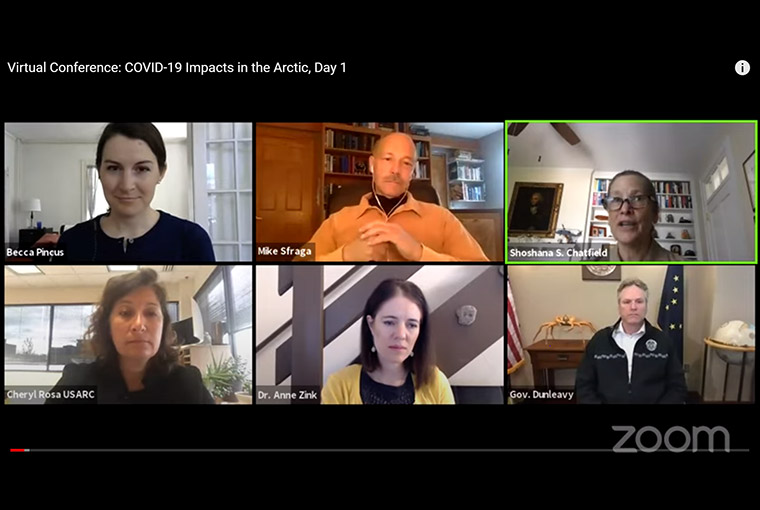Dealing With Pandemic at the ‘Top of the World’: Naval War College Co-hosts Conference on COVID-19 Impacts in Arctic

How do you follow COVID-19 guidelines for washing hands when there’s no running water in a rural village? How will Arctic science be affected by cancelled or diminished research trips this year?
These were some of the issues discussed at a May 19-20 conference about the impact of the coronavirus on the Arctic and its people. The two-day online event was hosted by the U.S. Naval War College in conjunction with the Woodrow Wilson International Center for Scholars’ Polar Institute and the U.S. Arctic Research Commission.
“The challenges faced by Arctic nations are amplified in the impacts of COVID-19, including gaps in communication, infrastructure and health care systems,” Rear Adm. Shoshana S. Chatfield, Naval War College president, told the group in her welcome address.
“As the world works to combat the COVID-19 pandemic and overcome its associated challenges, we must consider the special circumstances of Arctic regions and work together to find solutions that are informed by their realities,” she said.
Panelists included Alaska Gov. Mike Dunleavy, U.S. Coast Guard Vice Admiral Linda L. Fagan, members of Arctic native communities and representatives of Greenland and Iceland, in addition to other Arctic stakeholders.
Dunleavy told attendees that the reality is the “top of the world” may not go back to normal after the pandemic.
“Our death rates are low, at 10. Thank goodness. Hospitalizations are low. Our case count is low,” he said. “Some would say we’ve done a pretty good job of keeping these numbers low – but it comes at a price. The price for the world, the United States and Alaska is the economy is being pounded as a result of this.”
Before COVID-19, Alaska and other Arctic communities were trying to establish better ties, such as student exchanges and more broadband communication ability, Dunleavy said.
“We’ll pick that up again once we get through this pandemic,” he said. “But this pandemic is interesting, and its impact on Alaska will be talked about for many, many years to come, as was the Spanish flu.”
Fagan, who is the Coast Guard’s Pacific area commander, said the Coast Guard is fully operational, but COVID-19 has prompted ship crews to take extra precautions. For example, before boarding another ship during an encounter, a Coast Guard crew will ask about where the vessel has been and the health of the crew, in addition to donning googles, respirator masks and special protective suits.
Specifically in the Arctic, Fagan said, “We are very mindful as we think about our operations in the Arctic this summer – Arctic Shield and when (Coast Guard polar icebreaker) Healy deploys later in the summer for her missions. We are mindful of the many communities in and around Alaska and are taking all precautions to ensure that we don’t inadvertently help spread the pandemic.”
More than 800 scientists, policymakers, academics, military and Coast Guard officers attended the conference via the Zoom platform or a livestream on the Naval War College’s YouTube channel.
“The Arctic is important to all of us. And we are all wondering how this current crisis will affect the Arctic region and interact with all of the other changes occurring there,” said Rebecca Pincus, assistant professor in the college’s Strategic and Operational Research Department.
“During hard times, communities come together. But in the context of a virus, we have to find new ways of coming together to help each other out,” Pincus said.
Organizers said they pushed to assemble this conference virtually in light of many other planned events that had to be cancelled due to the pandemic.
“Two days, 10 panels, 60 speakers, a broad range of issues,” said Mike Sfraga, director of the Wilson Center’s Polar Institute. “A lot to build on, and we hope that we’ll continue to work together.”
Representatives from native communities talked about the long legacy of the 1918 Spanish flu virus, which nearly wiped out some remote villages and forced others to move from their ancestral lands.
With COVID, some modern challenges include how to employ social-distancing practices and quarantine of sick people in rural areas when families sometimes live with multiple generations in one home.
AlexAnna Salmon, council president of the Village of Igiugig, Alaska, said her community is taking a lesson from 1918 by being very careful about accepting freight shipments into the village.
Another issue is hunting and fishing enthusiasts who land on their shore, against the village’s wishes, she said.
“What does that mean when you are the mecca for 25 outside commercial sport fishing industry? It’s easy to say, ‘Oh, that’s the village, we’ll leave them alone.’ But we’ve been their first responders to all of their crises in the past,” Salmon said. “So we’re liable for more than our own people.”
To watch the two days of discussions, go to the Naval War College’s COVID-19 Impacts in the Arctic playlist: https://www.youtube.com/playlist?list=PLam-yp5uUR1YvXBWTF5T1rImMDcADBC9M
Coming up: The Naval War College’s Newport Arctic Scholars Initiative will host a virtual seminar June 9-10.
